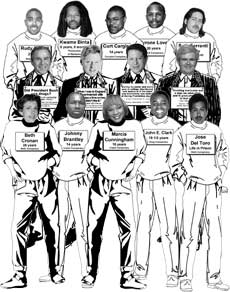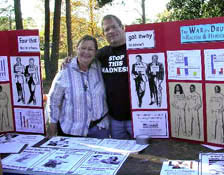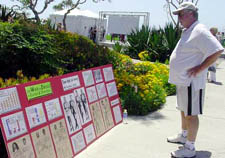
"Look, children," one teacher said to her assembled
class as they toured the informational tables and booths, "these
famous white men didn't go to prison, but these ordinary black
and brown people are locked up for the same use of illegal drugs."
If your group can use this display in your public education
projects, contact us at (509) 684-1550 or supplies©november.org.
Use your power! Stop the hypocrisy!
- Become a member of the November Coalition for $30 a year;
$15 students; $6 prisoners. Join
here
- Call, and visit your representatives
- Write letters to the editor of your local newspaper
- Speak out when leaders lie
- Invite us to speak in your community
- Share your views about the war on drugs with your friends
and associates
- Call talk radio stations and speak up
- Register and never forget to vote
- Be involved in your government
|
Expose drug war hypocrisy with a
Four That Got Away display
Imagine these familiar faces at a public event. The happy
faces in the Four That Got Away Display -- George W. Bush,
Al Gore, Newt Gingrich, and Bill Clinton contrast sharply with
the outrageous prison sentences of ordinary people.
Using the display is easy. Visually powerful, it will help
you, or your group educate others about drug war hypocrisy.

 The Four That Got Away Broadside is sure to
make an impact with your audience. Use alone, or with the full
display. The Four That Got Away Broadside is sure to
make an impact with your audience. Use alone, or with the full
display.
Insert a Four That Got Away Broadside in your bill
payments, correspondence to friends and family, or set up an
informational table and hand them out to the public.
Download
and print your own Broadside!
Back to the top
This campaign was inspired by The DC Action Committee.
|
"Four that got away"
across the country

Miami, FL, 2/20/07 - photo by Chrystal
Weaver

Ft, Benning, GA, Nov 06 - photo by
Fr. Tom
Hereford

Durham, NC, June 06 - photo by LaFonda
Jones

Laguna Beach, CA, 5/14/05 - photo
by Rachel
Morton
|
 The Message? Not in prison, in power! The Message? Not in prison, in power!
When the rich and politically connected buy and use illegal
drugs, they rarely face criminal sanctions. In the United States
it's "alive and in graduate school" for one class of
citizens - prison and stigma for another.
It wasn't until a major news reporter said that G.W. Bush
"certainly did drugs until 1974"(1),
that the presidential candidate told reporters he "had not
used illegal drugs for the past 25 years."(2)
Few have forgotten Bill Clinton's MTV, "I didn't inhale,
didn't try it again . . . but I wish I had," lines.
Al Gore admits to illegal drug use in college and the Army.
A co-worker, and close friend at the Tennessean newspaper, supported
allegations of regular recreational marijuana use by Gore.(3)
The most candid admission of past illegal drug use is from
former House Speaker Newt Gingrich, who declared, "Smoking
marijuana was a sign we were alive and in graduate school in
that era." (4) Today he
is a 'senior fellow' with the American Enterprise Institute.
These four men, equally representing Democrats and Republicans,
used their political office to intensify the war on drugs by
broadening police powers, search and seizure, and mandatory prison
sentences. Each are responsible for expanding prosecutorial authority
- all at the cost of ordinary citizens' civil liberties.
When Bush dodged questions of illegal drug use he said people
could "go find somebody else to vote for" and that
"voters are weary of the politics of personal destruction."(5)
Why must ordinary people's families be destroyed by drug arrest
and imprisonment?
The drug war has produced millions upon millions of life-long
felons. Today, on any given day in our country there are over
two million prisoners.
Incarceration rates of the last 25 years have made the United
States the world's leading jailer. The U.S. imprisons its citizens
at rates three to ten times higher than other democratic societies.
Punitive drug laws enacted in the 1980s, and to the present,
have resulted in 25% of all prisoners in the United States serving
time for a drug law violation. In the federal system, these people
make up about 60% of the prison population.
Many states, struggling to balance their budgets, are beginning
to release drug war and other nonviolent prisoners early. Meanwhile,
the Federal Bureau of Prisons is growing faster than any state
prison system in the country, with no parole or hope of early
release.
|



